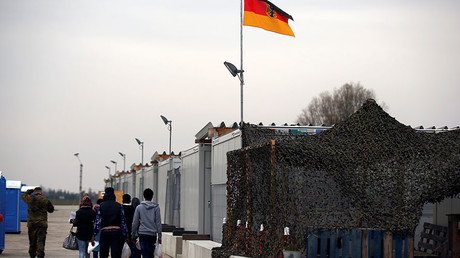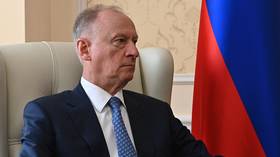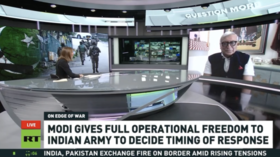Austrian defense minister eyes ‘protective zones’ to rid EU of illegal migrants
Austria has proposed tough new anti-migrant measures, with its Defense Minister calling for a pan-European cap on migration, external application centers for refugees and “protective zones” to hold and deport illegals from the EU.
The first step of Hans Peter Doskozil’s plan to fix migration problems in the EU involves establishing limiting migration numbers and “effective protection of the EU’s external borders,” Germany's Bild newspaper reported on Thursday.
“It’s about ending the failed European asylum policies. We must admit to ourselves and be honest that the EU has limited capacity to absorb more migrants. We must stop illegal immigration,” Bild quoted Doskozil as saying.
The total EU migration ceiling would be based on limits evaluated by the member states, thus forcing countries like Germany which do not have a limit to establish one. Doskozil has been a vocal critic of German Chancellor Angela Merkel’s “open-door” policy since the beginning of the refugee crisis.
“We must completely rethink the asylum system. The implementation of a united EU asylum system is necessary to deal with the crisis,” the minister said.
“There should be only an orderly system of legal entry for asylum-seekers. Asylum applications should only be possible outside the EU in the future,” the minister said, adding that migrants who had been denied asylum should be repatriated.
The minister’s plan also entails the creation of asylum centers in “third countries, such as Niger, Jordan, Uzbekistan,” where specially trained admission officers from EU countries would determine whether an applicant was eligible for asylum or not. Doskozil considers using the existing facilities of The UN Refugee Agency (UNHCR) for such asylum application centers.
“Close proximity of the centers to the migrants’ countries of origin would no longer force people to go to Europe to apply for asylum,” the minister said.
Migrants, who have been granted asylum would be eligible for a safe transfer to a receiving EU country. Such an orderly fashion would benefit those people who could get refugee status but could not afford the passage to Europe, the minister said.
READ MORE: ‘Some people in the EU feel there’s too much integration’ – former Austrian president
“In the future, asylum procedures should only be implemented in these centers according to human rights standards and according to EU standards. This could also permanently destroy the deadly business of human smugglers,” Doskozil said.
Migrants who were denied asylum and those who already entered the EU illegally but could not be immediately returned to their home countries due to various reasons would be transferred to some sort of special “protective zones” that were linked to asylum centers, according to the report.
“We should note, however, that it will not be easy and we must use all our resources to guard asylum centers and protective zones,” Doskozil said.
“But the effort that all EU states would have to put together would be worth it, and we will now be making a strong commitment at European level and looking for partners for our idea so that the asylum centers outside the EU can be established in the near future,” he added.
The next phase is “to promote the plan forcefully in Brussels” and will present his idea at a meeting of the Central European Defense Cooperation (CEDC) in February, Doskozil’s spokesman said.
‘You can’t blame the police for this. Politicians should be making changes’
It’s not just the politicians who are complaining. People in the streets of Innsbruck – which made headlines for the shocking number of sex attacks this New Year’s – tell RT things have changed for the worse, and they’d like to see more controls imposed.
“Many of the refugees who come here have no jobs and no future. When you have a lot of spare time and nothing to do, you start doing stupid things,” a young man in his 20s said.
A young woman of similar age said: “In the evening, I don’t feel as safe as I did a couple of years ago. You can’t blame the police for this. Politicians should be making changes.”
An older woman confirmed this, saying that, while she’s not afraid of being sexually assaulted, “it’s not nice anymore to go out in the evenings.”
“Obviously, the migrant policy has to change,” Lazslo Maracz, assistant professor of European Studies at the University of Amsterdam, says.
“There is here a dilemma: either you do nothing, and these sorts of things will happen. Or you go for the simple politics – like in Cologne, where you build up a fortress, restricting individual rights of European citizens with a massive police force on European celebrations and festivals. Our European way of life is at stake.”
Barbara Kappel from the Freedom Party of Austria also argued for the tightening of security measures. She believes “we need to deport [the migrants] of course, and we need binding agreements with third countries that they take back their citizens... because we know from the Ministry of Internal Affairs that 90 percent of the asylum-seekers who are not granted asylum remain in the country – and that’s a big problem.”
Chairman of the Austrian Muslim Initiative Tarafa Baghajati says, “we condemn every single act such as sexual harassment. That means there is no excuse at all, and we do not have any problem with any harsh penalties. But, at the same time, we are concerned with the whole atmosphere in the country,” he says.
“We cannot put... all Muslims under a general suspicion and say – ‘We cannot manage it.’ We can manage it.”
The idea of establishing asylum application centers close to the regions of migrants wishing to enter to the EU is not a new one. In 2004, Italy promoted a plan to establish such centers in Libya to filter the migrants and repatriate illegal ones. The idea was backed by Germany’s then Federal Minister of the Interior Otto Schily, but the plan failed.
Austria has been tightening its migrant policies following various incidents involving migrants. This has bolstered anti-migrant sentiment which announced a cap on asylum claims of 37,500 last year after taking in 90,000 asylum seekers at the peak of Europe’s migration crisis in 2015.
















